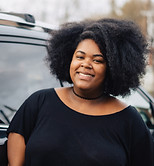
Blacksburg, Va., March 27 - A SURVIVOR: Quandra Moore is posing for a portrait. If you tell people you have cancer, they treat you like you're going to die," Moore said. "I'm like, 'Please don't treat me like this. Don't kill me off yet; I'm still here.' You don't have to feel sorry or guilty that I got it because no one goes down and intentionally seeks it. It's just a weird coincidence." Photograph: Ricky Lam.
The relationship with cancer
A look into one cancer survivor's feelings after revealing her condition to her family and friends.
Ricky Lam - March 28, 2017
Stating repeatedly throughout the interview, Quandra Moore stated one message: she didn’t want people to view her differently because she is a cancer survivor.
“When you get sick like that, people just come out of the woodworks and try to talk to you and be your friend,” Moore said. “Maybe they're just trying to be nice but it made me uncomfortable. I didn't like all that attention on me.”
Moore was diagnosed with ovarian cancer stage 1C from a juvenile granulosa cell tumor during her sophomore year, a rare type of cancer that has little research.
“It's basically a tumor that comes from your sex cells,” Moore said. “Since it's so rare, maybe one out of every five people that get ovarian cancer get this type of tumor. It does have a recurrence rate of five years but so far no one has really died from it yet.”

Blacksburg, Va., March 20 - BACK TO WORK: Quandra Moore is conversing with her studio friends while working on her floor plans. "I would never say I was unmotivated for my future career so I really don't think it changed me [the cancer] as much as people think it changed me," Moore said. "I'm pretty much the same person except my hair is a lot longer." Photograph: Ricky Lam.
Moore's family members reacted differently in terms of coping with the news.
“My mom was an emotional wreck the entire time. She still stresses out about it,” Moore said. “My older siblings were actually jealous from all the attention I received from it. I didn't want the attention; I was like, ‘You guys can have cancer next time. I don't want it.”
Even though she retold her story, Moore hopes that her time with cancer does not affect her public image.
“It's weird because if people ask, I don't mind telling. I'm not afraid or embarrassed but it's not something I want to be known for,” Moore said. “I don't want it to be a crutch like, ‘Hey guys! I have cancer give me everything and all the attention.’”
Despite being uncomfortable with the public attention she has received from cancer, Moore lit up as she explained that the experience taught her about the importance of living.
“I feel like having cancer, you realize how short life is and it puts in perspective what’s important and what's not,” Moore said. “I'm like, ‘Hey I want to move LA [Los Angeles].’ I'm going to go do it. What's stopping me? Things changed because you never know what's going to happen today or tomorrow. So just live.”

Quandra Moore, Student
